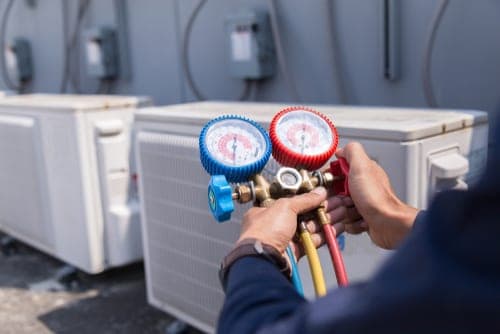Energy-Efficient HVAC Equipments to Save Money On Utility Bills
As energy expenses continue to increase, the value of energy-efficient cooling and heating systems comes to be progressively evident. These systems not only assure considerable savings on energy expenses yet likewise add to a more sustainable future by minimizing power consumption. With different alternatives readily available, including geothermal heatpump and ductless mini-splits, homeowner face a multitude of selections that can boost comfort and air top quality. Comprehending the crucial features and upkeep needs is necessary to making best use of these benefits. What aspects should be prioritized when choosing the right system for your requirements?
Benefits of Energy-Efficient HVAC Solutions
Energy-efficient a/c systems use various benefits that extend beyond plain expense financial savings. One considerable advantage is the lowered ecological impact. By consuming much less power, these systems add to lower greenhouse gas emissions, helping to combat environment change and advertise sustainability. This aligns with raising social needs for environmentally friendly practices in household and industrial settings.
In addition, energy-efficient heating and cooling systems frequently give boosted convenience degrees. Most of these systems feature sophisticated technology that enables better temperature level control and improved air quality (DMAKS HVAC). This causes a much healthier indoor setting, which is specifically important for individuals with allergic reactions or respiratory issues
Furthermore, purchasing energy-efficient HVAC systems can improve residential property value. As more consumers prioritize energy efficiency, homes and buildings outfitted with these systems might draw in higher bids in the real estate market.
Sorts Of Energy-Efficient A/c Options
How can homeowners and companies choose the most appropriate energy-efficient HVAC options for their requirements? The marketplace provides a variety of energy-efficient a/c systems, each developed to boost convenience while minimizing power consumption.
One alternative is the variable refrigerant circulation (VRF) system, which successfully manages the temperature in numerous areas within a structure. This system adapts its cooling agent flow to match the desired temperature level, causing considerable energy savings.
An additional prominent selection is geothermal warmth pumps, which use the earth's steady temperature level to warm and amazing spaces. By transferring warmth to and from the ground, these systems demonstrate outstanding performance, especially in modest climates.
In addition, ductless mini-split systems supply an energy-efficient alternative for homes doing not have ductwork. These systems permit zone-specific heating & cooling, minimizing power waste in unoccupied locations.
Lastly, high-efficiency furnaces and air conditioners, with sophisticated SEER and AFUE rankings, offer reliable environment control while taking in much less power than conventional designs. By evaluating these alternatives, homeowners and services can pick a heating and cooling system tailored to their details needs and energy performance objectives.
Key Attributes to Think About

Following, check out the sort of compressor used in the system. DMAKS HVAC. Variable-speed compressors can adjust their result to match the heating or cooling down demand, leading to enhanced convenience and power financial savings compared to single-speed versions. In addition, seek systems geared up with smart thermostats that offer programmable setups and remote access, allowing for much better control over power consumption
One more critical feature is the system's air filtration ability. High-efficiency filters can enhance indoor air top quality and lower power intake by ensuring the system operates efficiently. Take into consideration the news type of refrigerant used; modern-day systems frequently employ environmentally friendly refrigerants that have a reduced ecological impact.
Last but not least, make certain that the system is suitable with zoning innovation, which enables personalized temperature control in different locations of your home, improving comfort while reducing energy usage.
Tips for Picking the Right System


Next, take into consideration check here power effectiveness scores, particularly the Seasonal Power Effectiveness Ratio (SEER) for cooling down systems and the Yearly Fuel Usage Effectiveness (AFUE) for heating unit. Higher rankings suggest greater efficiency, which can lead to significant savings on energy expenses in time.
Furthermore, evaluate the kind of cooling and heating system that finest suits your way of life and budget. Alternatives consist of air conditioning, ductless mini-splits, and heatpump, each with its own set of benefits and drawbacks.
Do not neglect the importance of correct installment and sizing; an improperly sized system can result in inadequacies and enhanced wear. Consult with a specialist Heating and cooling service provider to get experienced suggestions tailored to your home's distinct requirements. This extensive technique will certainly ensure that you choose an energy-efficient cooling and heating system that meets your requirements and budget effectively.
Upkeep for Optimum Efficiency
When the best cooling and heating system is in area, recurring maintenance ends up being key to making sure ideal effectiveness and long life. A properly maintained system operates better, resulting in lower energy intake and lowered energy costs. Routine evaluations and tune-ups should be arranged at the very least two times a year-- when prior to the air conditioning period and once before the heating period.

Home owners must likewise be cautious about monitoring their a/c system's performance. Unusual noises, changing temperatures, or increased power expenses can indicate underlying problems that call for prompt focus. By dealing with these concerns quickly, homeowners can stop costly repairs and prolong the life expectancy of their systems.
Buying a maintenance plan with a certified specialist not only boosts performance however also supplies satisfaction, knowing that the system is operating at its finest. DMAKS HVAC. Normal maintenance is as a result essential for sustaining power performance and reducing general functional prices
Verdict
In conclusion, energy-efficient cooling and heating systems offer a viable service for minimizing energy costs while boosting convenience and air top quality. By including innovative modern technologies and options such as geothermal heat pumps and ductless mini-splits, homeowner can accomplish significant power savings and add to ecological sustainability. Careful consideration of system features and ongoing upkeep better makes certain ideal performance, making energy-efficient systems Learn More Here a sensible investment for both financial and environmental advantages.